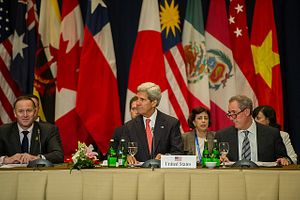The Rebalance author Mercy Kuo regularly engages subject-matter experts, policy practitioners and strategic thinkers across the globe for their diverse insights into the U.S. rebalance to Asia. This conversation with Charles Freeman III – International Principal at Forbes-Tate, former assistant U.S. trade representative for China affairs, who shaped U.S. trade policy toward China, as well as Taiwan, Hong Kong, Macao, and Mongolia, and oversaw U.S. efforts to integrate China into the World Trade Organization, former vice president for global public policy and government affairs at PepsiCo Inc., and a nonresident senior fellow in the John L. Thornton China Center at Brookings – is the 46th in “The Rebalance Insight Series.”
How might thought leaders and strategists in industry, government and civil society mitigate Asia’s geopolitical risks?
The first thing American political leaders might do is take a careful stock-taking of U.S. interests in the region and be sure that U.S. policy is being conducted strategically with respect to those interests. You can’t navigate geopolitical risks unless you know where you’re trying to navigate. Sounds simple, but a lot of policy with respect to Asia over the last couple of decades has been simply reactive to events in the region and in defense of existing architectures, rather than an effort to build outcomes that will best serve U.S. interests over the long term.
What top three trends are transforming Asia’s security landscape?
China’s enhanced – some might say aggressive – security posture in its near waters is itself transformative, but reactions of its neighbors and the United States to that posture are also transforming the geostrategic risk profile of the region. Second, the risks posed by a nuclearized Korean Peninsula continue to impact strategic calculations in the region. Finally, the security decisions that India will make over the longer-term may add to the overall complexity of the region geo-strategically.
As the nexus of geopolitics and business increasingly intersect, how should companies navigate U.S. policy to Asia?
U.S.-based multinational companies (MNCs) have long since learned that wrapping themselves in the American flag isn’t always a positive when conducting business in overseas markets. MNCs do a delicate dance between distancing their businesses from U.S. policy and leaning on U.S. government interlocutors who speak out on behalf of those businesses when they face domestic policy challenges in Asia. MNCs have a variety of tools to confront discrimination in overseas markets. The key, of course, is to ensure one’s business interests align as much as possible with others in the marketplace, including those of policymakers in that marketplace who value open markets and foreign business participation.
How might the Trans-Pacific Partnership (TPP) reconfigure regional trade and investment?
In general, some of the efforts to harmonize trade rules will make intra-TPP trade much smoother than previously. TPP updates a lot of rules which pre-date the enormous technological changes of the past thirty years. For a number of markets, the TPP will also confer some immediate benefits in terms of marginal competitiveness with non-TPP economies. Think of Mexico and Vietnam as alternatives to China as assembly nodes in the regional supply chain. I think that fact will stimulate efforts in other economies, including China, to get behind and seek to adopt TPP standards. We will see. One hopes that the United States passes TPP through the Senate so that we are able to take advantage of all the hard work by American negotiators.
How should the next U.S. president articulate the importance of U.S. leadership in the global economy to the American public?
The United States has been an enormous beneficiary of the global economic order represented by the WTO and the Bretton Woods organizations. We may be in a post-Bretton Woods world but the United States still stands for the principles of healthy competition and an open, rules-based architecture. We should practice as well as preach those principles. It may be that the next president needs to do a better job building broad-based domestic support for those principles, including by ensuring that fewer Americans are left behind by economic shifts to which freer trade policies can contribute. We don’t have real workforce re-training policies that are the natural companion of policies to keep markets open and efficient. Trade Adjustment Assistance (TAA) programs fall far short of the mark on that score.

































